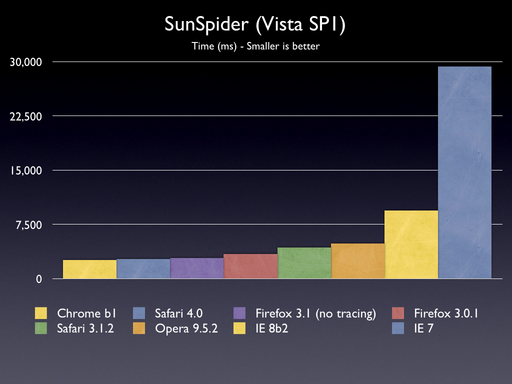qt8gt0bxhw|20009F4EEE83|RyanMain|subtext_Content|Text|0xfbfff64a00000000b700000001000a00
This week Google released their new browser,
Chrome. There has been so much
buzz about it that it's been deafening. It is seriously amazing how passionate people get about a browser. But let's face it,
a browser is likely what most people use more than any other software on their computer now days. I spend so much of my time online. Performance is important to me, just like anyone else. Since Chrome's release, I've spent some time reading performance metrics in an attempt to see past the marketing hype, and I've been pleased with what I've found. Not specifically with Chrome, but with the improvements across the board with many, but certainly not all, browsers.
First off, let me get this out of the way. I've used Chrome, but I am not sold on it at all. It lacks many features I find critical, or at least useful, in a browser. I am not a GOOG-fanboy and I typically don't care for many things that Google puts out, aside from search. I'm not on that "anything that Google does is gold" bus. I do, however, love Firefox. It is my browser of choice for many reasons, but mainly because it performs well and I love the extensibility of it with addons (not to mention the huge community around addons out there, you can find about anything to make the browser work the way you want it to)
This all started when a consultant I work with sent me an e-mail discussing how a particular
web-based CRM application that I work with performs so much faster using Safari. This consultant would demo this software to clients using Internet Explorer and the demos would never go too well. Everything would appear a bit slow and sluggish. This particular web-based CRM application is a bit heavy on the client, using Ajax for about anything that happens in the browser. One day he decided to test out some other browsers and was amazed at how much faster this application performed using Safari. When he let me know his findings I ran some tests between various browsers with this CRM application and was astounded by the results. The performance of the application with Safari was a clear and noticeable improvement over other browsers I tested with. I was amazed at how drastic the performance improvement was. It was an obvious improvement, even without sophisticated tests, as an end user you could easily see the difference.
This eventually led me to
a new post today by jQuery rock-star John Resig. This is an extremely insightful post, and like anything from John is very factual and presents the information in a very non-biased manner. John performs tests on the Javascript processing engines in the mainstream browsers (IE 7 & 8b2, Firefox 3.01 & 3.1, Chrome, Safari, Opera, etc). The article is well worth the read, especially for any users still using IE. I've never been an "IE basher" in any way at all, but these facts do speak volumes on the lower quality experience you might be seeing on the web if you're an IE user.
 Chart from John's rundown - I'd highly recommend reading John's post (link below).
Chart from John's rundown - I'd highly recommend reading John's post (link below).
While Chrome is based on
WebKit (the same open source browser engine that behind Safari), it uses Google's own Javascript engine
V8, which is also open-source. John's test show some big performance "oohs" and "aahs" for Chrome, which is very nice. However, and this is my Firefox bias showing, that V8 will only lead the game until Firefox 3.1's TraceMonkey hits the streets.
Another
set of tests from Lifehacker show that Chrome wins (when compared to IE8 and Firefox3.1 betas) in browser startup time only (which I don't care so much about since I don't often close my browser), while Firefox performing better or at least the same in other tests for memory usage and Javascript & CSS processing. It's also worth noting that IE8 is still performing behind the two on all tests.
Overall, I think it is overwhelmingly great that
performance, for my most utilized application, has become such a important metric across the board for all browsers. While I am not too thrilled about yet another browser in the game, and my initial reaction as a web developer was "oh no, another browser to support", the idea of Chrome raising the game for everyone is completely welcome. I won't be switching to Chrome. I don't think I ever will. However, I am sure to see the effects by some new competition in the war of the almighty browser. The best thing about it, the competition is all focused on performance, and that is good for everyone.